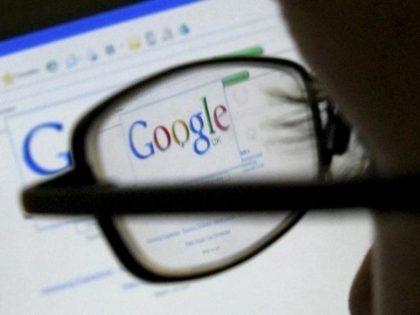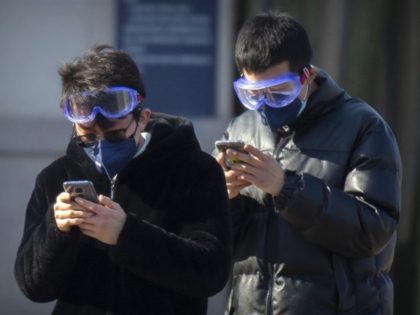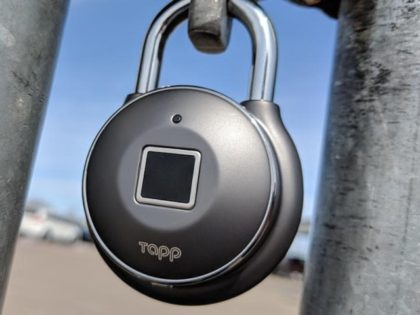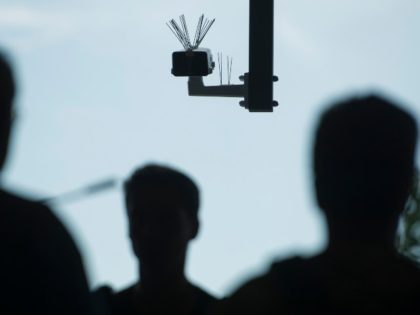Creepy Robot Dogs Patrol Singapore Parks to Enforce Social Distancing
Robot dogs named “Spot” have reportedly been dispatched to parks in Singapore to remind citizens of safe social distancing measures.

Robot dogs named “Spot” have reportedly been dispatched to parks in Singapore to remind citizens of safe social distancing measures.

Video-conferencing company Zoom has reportedly struck a deal with New York Attorney General Letitia James this week closing an inquiry into the app’s security problems.

Google-affiliated company Sidewalk Labs has reportedly abandoned its plan to build a high-tech “smart town” on Toronto’s waterfront due to “unprecedented economic uncertainty.” The project had already faced controversy around the tech giant’s data collection plans, with the Canadian Civil Liberties Association called it a “data surveillance test bed.”

A change in Facebook’s software development kit this week caused widespread crashes for multiple popular iPhone apps including TikTok, Spotify, Pinterest, and Venmo, show just how deeply Facebook has integrated itself into the other apps found on the phones of millions of Americans.

Retired Lieutenant General H.R. McMaster, the former National Security Adviser to President Donald Trump, has joined the board of Zoom, the video conferencing platform that has been plagued by security issues and concerns about communist China.

According to a recent report, adult cam website Cam4.com left almost seven terabytes of private data exposed on the internet. The massive leak contained nearly 11 billion records including payment history, email and conversation logs, and IP addresses.

Apple and Google have reportedly claimed that they will ban the use of location tracking in apps using the new contact tracing system being developed by the two tech giants that they say will help slow the spread of the Chinese virus.

According to a recent report, Tesla components containing the previous owners’ personal information are appearing for sale online.

A recent report from cybersecurity researchers claims that Chinese electronics maker Xiaomi is spying on users’ web and phone use using “backdoor” technology built into the company’s smartphones, which run Google’s Android OS.

Facial recognition firm Clearview AI, which has come under fire for scraping social media sites such as Facebook to create a facial recognition library, now reportedly plans to work with the government on Chinese virus contact tracing.

Less than a month after launch, the mobile-only streaming platform Quibi has discovered that its email verification process for new accounts leaked data to multiple third-party advertising and analytics companies, including Facebook and Google.

Video-conferencing app Zoom has admitted that it doesn’t have 300 million daily active users, as it has previously claimed.

Social media start-up Parler is once again punching above its weight class, saying that Facebook ought to pay more than the $5 billion fine recently approved by a federal judge for the company’s violations of user privacy.

Video conferencing service Zoom has reportedly reached 300 million users despite its growing number of security and privacy issues. The company’s userbase has surged 50% in just the last month based on the economy and education system relying on the service.

A recent report claims that as many as 25,000 email addresses and passwords allegedly belonging to the NIH, the W.H.O., the Gates Foundation, and other groups have been leaked online.

Video conferencing software Zoom has faced criticism in recent weeks for its vulnerability to “Zoom bombing” in which people connect to private calls to generally cause mayhem. Here are four key steps you can take to prevent the disruption of meetings whether for work or school.

A recent report from The New York Times reveals that file-hosting service Dropbox privately paid hackers to find bugs in the software of video conferencing firm Zoom and then pressured the company to fix them. It reportedly took more than three months for Zoom to fix one of the security lapses identified by Dropbox.

The source code of controversial facial recognition tech startup Clearview AI has reportedly been exposed due to a lapse in security measures.

The ACLU criticized a new tracking feature designed by Apple and Google to limit the spread of the Chinese virus. The feature uses BlueTooth technology to track a smartphone user’s distance from other users that have tested positive for the Wuhan coronavirus.

According to a recent report, hackers are selling two critical vulnerabilities for the video conferencing software Zoom that could allow people to gain access to private accounts and spy on calls. The price for an exploit that would allow a hacker to take control of a Zoom user’s computer is reportedly $500,000.

Standard Chartered is reportedly the first major global bank to instruct employees not to use the Zoom video conferencing app or Google Hangouts during the Wuhan coronavirus pandemic due to cybersecurity concerns.

A recent report claims that the login details for over 500,000 Zoom accounts have been shared or sold on hacker forums and the dark web.

Tech giants Apple and Google, which together have near total control of the smartphone market, promise that only public health authorities will be able to access the companies’ new contact-tracing technology and governments will not be allowed to force people to use the technology.

According to a recent report from Time, U.S. Intel Officials believe that foreign spies are targeting video chatting platforms such as Zoom to spy on business executives, government officials, and scientists using the apps during the Wuhan coronavirus pandemic.

Apple and Google, who together control over 99 percent of the global smartphone operating system market, are joining forces to track contact between carriers of the Chinese virus and other individuals, using smartphone location data.

The U.S. Senate Sergeant-at-Arms has reportedly advised members to cease the use of video conferencing app Zoom following a number of security issues being made public in recent weeks. The New York City Department of Education, Google, and the Taiwanese government have all banned the use of Zoom.

According to a recent report from the Electronic Frontier Foundation (EFF), social media website Twitter has removed a privacy option that the EFF believes proves why stronger privacy laws are essential.

Tech giant Google has banned Zoom, the videoconferencing service that has enjoyed explosive growth during the Chinese virus lockdown, from employees’ computers, citing potential security vulnerabilities.

Israeli intelligence agency Shin Bet has used cellphone location data to identify 1,500 new Chinese virus patients, according to reports in Israeli media.

According to a recent report from the FTC, “smart locks” produced by Tapplock are leaking users’ personal information and not delivered the security they promise.

According to a recent report, video conferencing app Zoom has admitted that some Zoom video conferencing calls were routed through China. According to the researchers that discovered the routing problem, Chinese authorities could demand that Zoom turn over any encryption keys on its servers in China in order to decrypt the contents of video calls.

The CEO of video conferencing powerhouse Zoom has apologized for the app’s numerous security issues allowing tricksters to derail meetings by “Zoom bombing” as it reaches 200 million daily users. Among other measures, Zoom will devote all its engineering resources to safety and security.

Video conferencing app Zoom is facing concerns over its privacy and security features as many users fall victim to call hijacking and “Zoom bombing.”

A group of 400 cybersecurity volunteers from across the world has banded together as the “COVID-19 CTI League” to fight back against hacking related to the Wuhan coronavirus pandemic.

Florida State University announced last week that it will adopt an exam software that will record students at home through their webcams. Now, students are arguing that the software violates their privacy rights.

A recent report outlines how a secretive company named Banjo allegedly employed similar methods to Cambridge Analytica to scrape the personal data of social media users using fake apps offered by a shadowy company it controlled, “Pink Unicorn Labs.”

Google recently announced that it would phase out third-party cookies, which track activity while browsing the web, in a move the tech giant says is aimed at protecting “privacy.”

The FCC has reportedly proposed fines totaling more than $200 million against the largest wireless carriers in the United States over the sharing of customers’ location information with outside parties without data safeguards.

A new report suggests that dozens of American colleges and universities are adopting technology that allows administrators to track, monitor, and surveil students. Students from across the political spectrum have joined together to push back against this concerning trend.

Facial recognition company Clearview AI, which works with hundreds of law enforcement agencies, has stated that the firm’s entire client list has been stolen, including how many users each client has, and how many searches they have completed using the service.
